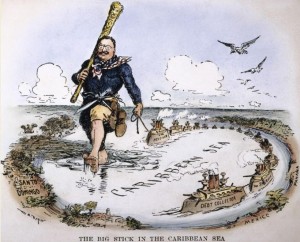
America’s history of foreign policy is a singular and interesting subject. At first, the United States was an isolated nation, doing business and entering into trade with other countries but refraining from making bonding alliances or intervening in foreign affairs. The fact that they went to war with Tripoli, so soon after their independence, as they did, was curious enough. Americans refrained from entering into international warfare. When Europe was plunged in war from 1800-1815, the United States remained neutral.
After the Civil War, however, the United States began to emerge from its shell and intervene in world affairs. The Monroe Doctrine, established in 1823, dictated the way in which Pan-American affairs would be governed. The doctrine declared that it was not the responsibility of the European nations to intervene in Latin American affairs and that Latin America was “off-limits” to European colonization. Besides going to war with Mexico in 1846, the United States hadn’t made any major interventions in Latin America either. The Monroe Doctrine was actually the philosophy of John Quincy Adams. He was Vice-President at the time, under James Monroe, whose name endured with the doctrine. Distracted by the Civil War, the United States let the French slide into Mexico in the 1860s. They were kicked out by the Mexicans themselves in 1866.
Presidents after the Civil War seemed more interested in domestic issues: Reconstruction, labor reform, industrial mobilization and the like. William McKinley decided to break this pattern in 1898. His administration annexed Hawaii and declared war on Spain. After this “splendid little war” he promptly took control of Puerto Rico, Guam, Wake Island and the Philippines. The Philippines came at a price however. Twenty million dollars to Spain and a hard-fought war against Filipino rebels under Emilio Aguinaldo. Indeed, the war lasted longer than the Spanish-American itself. McKinley’s American Imperialism wasn’t without enemies. Among these was Mississippi River local color writer and essayist Mark Twain.
When McKinley was assassinated in 1901 at the Pan-American Exposition the Presidency was passed down to Theodore Roosevelt. Roosevelt continued his predecessor’s imperialist policies. He established the Roosevelt Corollary to the Monroe Doctrine. This philosophy established the principle of American intervention in Latin American affairs. Roosevelt was (and still is) famous for his iconic axiom, “Always speak softly and carry a big stick”. He used his big stick to seal deals such as the Panama Canal. His Corollary served as a prelude to the “Banana Wars”, a series of American military occupations in Latin America and the Caribbean. Roosevelt’s foreign policy was appropriately called “Big Stick Diplomacy”. He muscled the Germans and British away from a near-incursion into Venezuela in 1902. Roosevelt wasn’t a warmongering imperialist though. He was also, almost singularly, responsibly for ending the Russo-Japanese War in 1905.

And he was a Nobel Peace Prize recipient for mediating the Russo-Japanese peace treaty. I guess you could say he actually earned it.